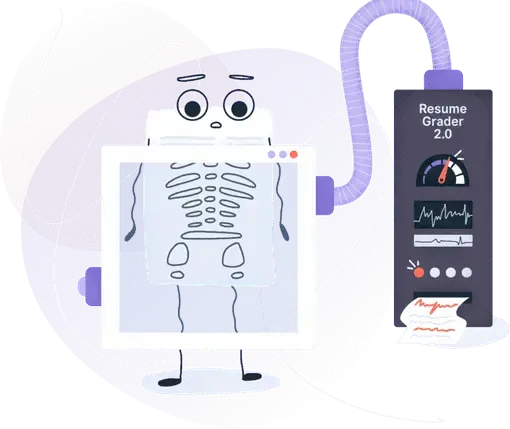Employee Relations Resume Skills: Guide to How to Add them To Your Resume
Here are the top ways to show your Employee Relations skills on your resume. Find out relevant Employee Relations keywords and phrases and build your resume today.


Is your resume ATS-friendly?
Drop your resume here or upload a file to find out if the skills in your resume are readable by an ATS.
Disputes in the workplace happen; very often for some of the most trivial things.
They can alienate people - where you suddenly feel like the person, who you see every day right across your computer screen, is on another planet.
That's why employee relations can be one of the most fundamental HR skills to foster relationships and teach teams how to work better together.
This communication and interpersonal function deals with:
- operations management - installing strategies to improve individual performance
- employment contracts - explaining compensation and benefits
- conflict resolution - assessing, counseling, and solving issues pertaining to employee relations and labor issues
- learning and growth - promoting employee health and wellbeing
Employee relations usually aim to increase efficiency, team spirit, and motivation by preventing possible disasters, based on individual behavior.
Why are employee relations important on your resume
Here are some U.S. Bureau of Labor Statistics - by 2030, the employee relations field is expected to grow by another 9%.
What this means for professionals is that there is a rising demand for this particular skill set, which will also provide an opportunity for better compensation for skilled professionals.
And as to why employee relations are important to organizations - imagine an office where there's no meditation and counselling on HR matters.
There will be:
- constant conflict regarding room temperature, office desks, responsibility, etc.
- ever-rising confusion about salaries and expectations.
A side effect of this toxic space is a disgruntled work force and nothing getting done at the end of the day.
That's why employee relations serve as a north start to guide those stormy, interpersonal relationships towards a better (and more productive) work environment.
What skills, activities and accomplishments help you highlight your employee relations
Choosing which skills would best show your employee relations should be based on the job description and your experience. Some of the more popular ones you could write about are:
Communication skills: effective interpersonal relationships are at the heart of any happy workplace. As an employee relations specialist, it's your role to ensure the dissemination of all relevant information, whether that's via emails and newsletters; phone calls and presentations.
Make sure your resume can pinpoint instances where you've had to spread helpful guidance around the office, focusing on accuracy and speed.
Labor laws and regulations knowledge: employee relations professionals must ensure that their organization complies with employment policies and regulations (e.g. the Fair Labor Standards Act). Legal frameworks always require professionals to stay updated with the latest regulations.
On your resume, you can list the latest courses, workshops, or training seminars you've taken to make sure your knowledge is relevant.
Investigation and assessment skills: to any dispute, there are always two sides. Working in employee relations, it's your duty to gather all the facts and look into the detail of the matter, before you can analyze the case.
Mention on your resume how you stay impartial, using different frameworks to settle human resources-related disagreements.
How to demonstrate employee relations on your resume:
- Build up your resume: start with the individual impact you’ve had to how you’ve enhanced team culture and, finally, how your role has affected the whole organization (or you can first list the big picture and move on to the details)
- Shine a light on all the communication tools you’ve used to keep your colleagues informed; to measure your impact, you can always refer to any annual company-wide survey regarding employee satisfaction
- Highlight the practices you’ve installed to improve team members’ mental health and physical wellbeing
- On the admin side of things - how do you process HR-related information? Think about file management and organization, as well as databases you use and how they’ve impacted your productivity
- If you’ve ever negotiated contracts with employees, your resume could be a fantastic opportunity to highlight your skills with a focus on outcome
Employee relations are one of those in-demand soft skills that show recruiters your ability to create better work culture.
That’s why it’s important to list your proficiency with a focus on impact, rather than just as an item you have to check off somebody’s list.
If you’re still in the dark as to how to list your employee relations skills in different parts of your resume, we’ve got you covered with the next section of this guide.
Example 1: Demonstrate employee relations in the experience section
- •Enhanced employee culture by providing individual and team counselling sessions to all 120 employees, boosting overall productivity by 25%
- •Used WorkDay to create and update the database of work (and benefits) contracts - optimizing the efficiency of the HR admin department by cutting back 35% of processing time
- •Assisted the compliance department in resolving 12 cases in labor disputes
- •Organized company-wide quarterly health and safety training that resulted in decrease by 50% in workplace acciedents
The expert in the resume above proves that they are apt at increasing employee productivity with various practices.
This example also relates their experience in administration, resolving issues, and team work. As a brownie point, they’ve also listed the software they use to create and manage data.
You can always use this resume section to include specific training programs you’ve implemented - just don’t forget to mention how they’ve impacted the organization.
Example 2: Demonstrate employee relations in the resume summary section
The resume summary section provides you with another great chance to bring your employee relations skills to recruiters’ attention.
In the example above, the professional starts with their philosophy and motivation, then moves on to communication achievements.
The final sentence is to highlight a recognition that is important for their industry and work practice.
Example 3: Show your employee relations in your achievements' section
The achievement section of your resume provides you with an opportunity to focus more on training sessions and workshops you’ve implemented, certifications and recognitions.
Remember to always stay specific about your results, with a focus on how they’ve impacted the organization.
Example 4: demonstrate the skill through other sections of your resume
Employee relations could be demonstrated through various other sections of your resume.
For example, you could showcase how you prioritize your time with a graph to illustrate various employee relations skills and activities.
Or you could have a separate section dedicated to your communication skills with a focus on your best employee relations skills.
The choice is entirely up to you.
Employee relations skills: key takeaways for your resume
- By 2030, employee relations as a field is expected to rise by 9% - providing many exciting opportunities for skilled professionals
- Illustrate the impact your employee relation skills have had on individual colleagues, teams, and the big picture
- Whatever section(s) of your resume you choose to focus on your employee relations skills, be specific about how your achievements have impacted the work place culture (employee satisfaction surveys are a great place to start)
Make one that's truly you.




